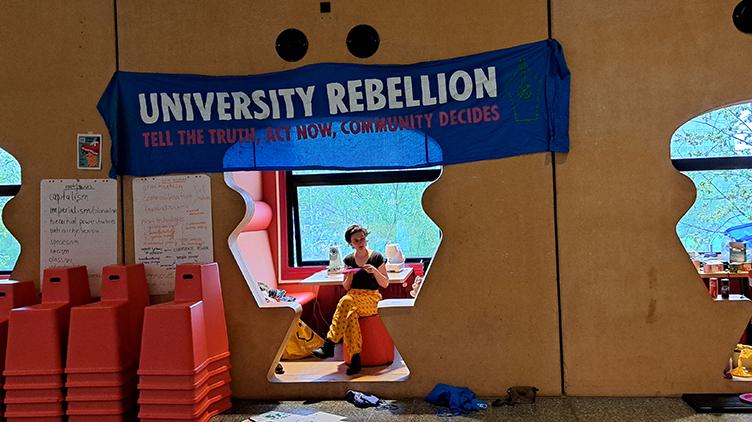UvA Rector Peter-Paul Verbeek:
'Academic freedom requires the courage to doubt'

Verbeek, who is a Philosopher and rector of the University of Amsterdam (Uva), began his lecture at KNAW's Academy Day by stating that discussions on academic freedom used to be about “far-off foreign countries where academics are oppressed but this picture has changed a lot these past few years.”
In 2021, Verbeek chaired a KNAW committee which took a detailed look at academic freedom. In his Academy Lecture, he highlighted a series of new challenges. According to him, given the widespread discussions about "wokeness", knowledge security and climate activism, we suddenly have every reason to rethink academic freedom and its meaning here in the Netherlands too.
Climate activism
In recent months, many Dutch universities have been targeted by action groups who staged sit-in protests to demand the institutions cut all ties with the fossil industry, particularly Shell. Verbeek argues that universities are faced a difficult choice: should they restrict academic freedom for ethical reasons or is it in fact unethical to restrict the academic freedom of the scientists who are willing collaborate on sustainable energy with the fossil fuel sector?
The point at the heart of Verbeek’s lecture is that academic freedom presupposes the courage to doubt. “Demonstrations are all part of driving that doubt, which makes them a great asset to universities. But protests also need to respect the room for doubt: when demonstrating means making demands without any opportunity for discussion, academic freedom loses out.”
Wokeness
Academic freedom therefore requires academics not to impose their own sense of what is morally or scientifically right on others. Rather, they should be willing to engage in debate at all times. It is up to the university to provide space for academics to doubt and establish ethics committees to ensure the free exchange of knowledge.
Verbeek insisted that the same principle applies to those who are fiercely engaging in a debate about "wokeness", which means "equality and justice" for some and "an exaggerated focus on gender and ethnicity" to others. "Holding on to unshakeable truths does not help,” he concluded.
Knowledge security
The third challenge Verbeek focused on is the growing concern about knowledge security, which means that scientists no longer feel free to work with anyone they want to.
KNAW president and biophysicist Marileen Dogterom shared this concern in her annual address. She argues that the need to protect knowledge is at odds with the ideals of open science, which are all about making scientific knowledge accessible to everyone.
She welcomes government initiatives such as the knowledge security helpdesk, which supports scientists in making the right trade-offs when engaging in international cooperation. But she is less positive about the prospect of screenings to assess collaboration with scientists outside the EU, which would hit a wide range of research areas. “Especially when it seems that the aim is to use this to protect not only national security but also our economic interests.”
Dogterom is not an advocate of the latter. “We can only remain at the forefront of science – and, therefore, technology – if we share knowledge and encourage academic exchange, including with countries outside the EU. After all, this has bolstered the power of Dutch science and innovation so far and there is no reason to believe that it will not do so in future too.”